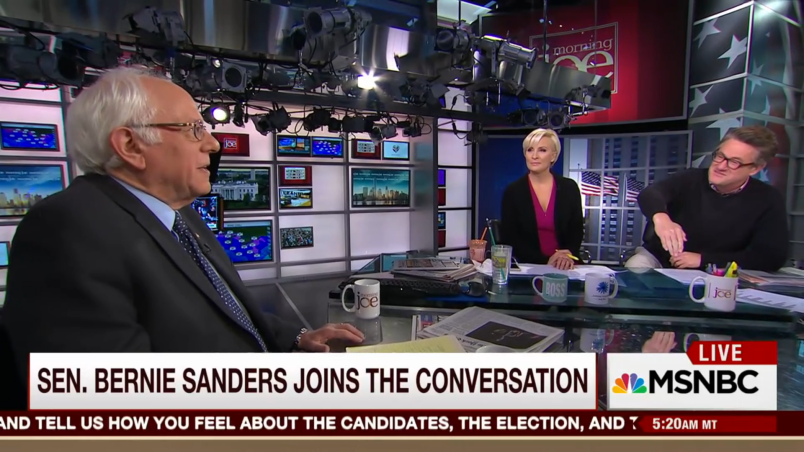Sen. Bernie Sanders (I-VT) got a second chance to explain how he would implement his economic policy during a Friday morning appearance on MSNBC’s “Morning Joe.”
Sanders’ interview with the New York Daily News editorial board, which was published Monday, covered Wall Street reform, gun ownership and Middle East policy. But reactions to the interview largely focused on Sanders’ comments on breaking up the big banks.
“Some answers they felt you came up short with, especially on your main message. So I’ll re-ask those questions,” host Mika Brzezinski said to Sanders. “I’m literally taking the Daily News interview and borrowing from this great interview. By what authority and how would you go about breaking up the largest financial institutions in the country?”
“You ready for the answers?” Sanders joked to Brzezinski.
“You can do it in a couple of ways. One way is you can use Section 121 of the Dodd-Frank legislation,” he elaborated. “And number two—better, and I would prefer—is pass by legislation. What my legislation and the legislation that I’ve introduced says that the secretary of the treasury will have the authority to investigate and determine which banks pose systemic risks to our economy. I.e., if they’re too big to fail, they can bring down a significant part of the economy and within a period of time, the secretary can break them up.”
Brzezinski also asked Sanders to explain what a large financial institution like JPMorgan Chase or Citibank would look like in the second year of his presidency.
“What I said is after they’re broken up that is their decision to reconfigure how they want to do it,” Sanders said. “It’s not the government’s business. We tell you you can’t be this big, you’re too much of a danger. Go from there, this is how big you can be. I won’t run JPMorgan.”
Watch below via MSNBC:







Unfortunately, Bernie getting a “do-over” is not something that you get to do as President. He’s been campaigning for over a year on “breaking up the banks” and has few answers on HOW to actually do this.
So basically, Sanders will waste a lot of political capital to attempt to pass legislation that will never make it out of the Congress to have the power to do what the President already has the power to do under Section 121 of Dodd Frank. Now I know why he gave a non-answer to the NYDN interview. His proposal is more about the tangible expression of anger rather than something that would provide a significant net change to how the financial industry is regulated.
Even with a do-over, it sounds simplistic–you are too big; get smaller; I don’t care how.
Or whether they stay in business or go out of business. Great pitch in NY Bern.
For some reason, this just doesn’t ring true to me. However I really need other people to weigh in on this who are well versed to explain the following:
How would enacting TBTF legislation have prevented the CDO’s and/or mortgage bundling?
What does enacting TBTF legislation do vis a vis creating top heavy companies?
For ex., Jamie Dimond breaks JPMorgan up into 3 separate entities. However, 1 of those entities is still engaging in very specious financial trading. Sanders claims it’s not up to the gov’t. to manage the reconfigured businesses but I’m still not seeing how the solitary act of breaking up companies does what he thinks it would do. Where’s the regulation of the broken up entities? This strikes me as exactly what khyber900 says: it’s basically an expression of anger.